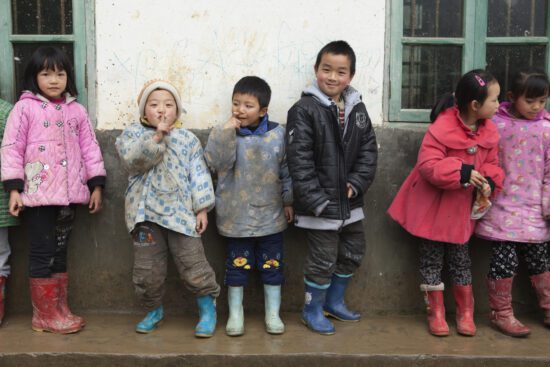In July, the U.S. Supreme Court handed down the decision in the Dobbs v. Jackson Women’s Health Organization1https://www.supremecourt.gov/opinions/21pdf/19-1392_6j37.pdf case that reversed the precedents set in landmark abortion cases Roe v. Wade2https://www.oyez.org/cases/1971/70-18 and Planned Parenthood v. Casey.3https://www.oyez.org/cases/1991/91-744 The issue of abortion has now been sent back to the states and will be governed at a local level. Some states have passed robust laws that protect the preborn, and sadly, laws in other states offer little to no protection for the little ones in the womb.
At the time of publication, abortions are restricted or banned in at least 17 states, with a number of states expected to take steps to restrict abortion.4https://www.nytimes.com/interactive/2022/us/abortion-laws-roe-v-wade.html While we are grateful for each and every life saved from abortion, the reality is, there will be even more women and children in need of support than before. For decades, churches, Christians, and faith-based pregnancy resource centers have been on the frontlines of serving women. Pro-life work today is built on the shoulders of the faithful over the years. Yet, the Church must be ready to meet the increased need in this new moment.
Scriptural Basis for Caring for the Vulnerable
The Bible is clear that those whom God saves are to work out their salvation with good works (Phil. 2:12). Our good works stem from changed hearts that are called to love the Lord with all we have, and to love our neighbors as ourselves (Matt. 22:34-40). One of the biblical directives Christians are given is to care for the vulnerable and the fatherless. Throughout Scripture, we see numerous instances of God protecting orphans and urging his followers to do the same (James 1:27; Psa. 68:5-6).
The Word is also clear that every person is made in the image of God, including the preborn (Gen. 1:27; Luke 1:41), which means we are to defend every individual’s right to life. And in addition to protecting vulnerable little ones in the womb, we must also care for their mothers, fathers, and families. That commitment of care should extend well beyond a child’s birth. Two of the ways we can care for children is through adoption and foster care.
Adoption
The Bible tells us that those who trust in Christ are adopted in God’s family as his children. Our spiritual adoption is one of the realities that propels us to love our neighbor and is the foundation for our understanding of earthly adoption (Rom. 8).
Adoption is good and beautiful, but in a fallen world, it is always born out of loss.
All parties involved in an adoption experience loss. The birth mother makes an incredibly difficult decision to develop an adoption plan for her child and walks through the loss of not parenting her child, even if it’s in her and her child’s best interest. For an adoptee, even if they were adopted as an infant, their story began with loss, because there was a break in the natural order of the family. And for adoptive parents, there’s typically an extensive financial, emotional, and time commitment to building their family through adoption.
Foster Care
Conversations around adoption and foster care need to make it clear that these two things are separate. Making an adoption plan is not the same thing as a child entering into foster care. There are currently 407,493 children in the U.S. foster care system.5https://www.acf.hhs.gov/sites/default/files/documents/cb/afcarsreport28.pdf The goal of foster care is reunification, but approximately one-fourth of children and youth in foster care are eligible for adoption, meaning there’s no chance that they’ll be reunified with their biological family.
Almost every community across the United States is in desperate need for more families to open up their homes and become foster families. Children enter foster care through no fault of their own. For many of these children, circumstances do not change, and they age out of the foster care system without a family or a support system. While there have been policy changes that focus more on prevention and keeping families (safely) together, one of the greatest needs is for more Christian families to open their hearts and homes to children in foster care.
How Churches Can Engage
The mission of Lifeline Children’s Services is to equip the Body of Christ to manifest the gospel to vulnerable children.6https://lifelinechild.org/ In Psalm 68, David tells us that God sets the lonely in families. We want the children we serve to have forever families, but more than that, we want them to know the truth of the gospel.
To that end, the programs that Lifeline offers are meant to connect vulnerable children, women, and families to the local church and local body of believers. We want people to receive practical resources and support, but also to hear the good news of the gospel and have access to a community of Christians. Lifeline has a number of programs that local churches can utilize to minister to children and families in their communities. If you are a pastor, ministry leader, or church member who has a desire for your church to engage, I encourage you to prayerfully consider how the Lord has equipped your church to minister to the needs of your community.
How Individuals Can Engage
Each one of us can make a difference in the lives of others. While not all of us are called to adopt or foster, we are all commanded to care for vulnerable children in some capacity (James 1:27). While different seasons of life might mean that engagement changes, we should seek God’s wisdom on how to care for our local communities.
To love our neighbor, we must first know our neighbor. We must go beyond our screens and social media accounts to the embodied people in our neighborhoods, cities, and communities. We can make a huge difference in the lives of others just by showing up. Presence is deeply powerful. Look someone in the eye, get to know their name, their story, and seek to care for that person holistically.
Below are a few practical ways to get involved in caring for the vulnerable in a post-Roe world.
Volunteer your time, talent, or treasure: We’re all called to steward our time, talent, and treasure for the good of others and the glory of God. Consider volunteering your time to serve at your local pregnancy resource center or church-based program, or mentor a woman facing an unexpected pregnancy or a youth in foster care.
If you’re gifted in a particular area, you could use your gifting to serve vulnerable people in your area. For example, if you’re financially savvy, you could volunteer with a program like Heritage Builders that helps older youth in foster care as they reach the age at which they must transition to independent living.7https://lifelinechild.org/heritage-builders/ Heritage Builders provides one-on-one relationships, provides life-readiness training and connects youth to practical resources. Additionally, you can use your treasure to support organizations that are doing gospel-centered work.
Each one of us has varying levels of resources to invest in the Kingdom of God. May we invest wisely.
Consider providing respite care: Some aren’t called to full-time foster parenting, and others are not in a season that will allow for it. But maybe you could consider providing respite care for children and families. Respite care is short-term care for children that allows families who are experiencing social isolation to have access to a support system in the local church. Providing respite care can look like a few hours one afternoon, a weekend, or a few weeks. Respite care is not intended to be long-term, out-of-home care for vulnerable children.
Support those who are adopting or fostering: Families who adopt or foster need support, care, and encouragement. While these journeys are beautiful and restorative, they can also be difficult and exhausting. You can provide practical support and encouragement to these families. It can be as simple as bringing a meal to them in the midst of a particularly busy season, remembering to regularly check in on them, or learning trauma-informed practices to be better equipped to interact with them and their families. Trauma-informed care recognizes the effects of trauma on a child and helps us understand the paths for recovery from that trauma. You can also support vulnerable children, families, and adoptive and foster families by committing to regularly pray for them.
Adopt or foster: Pray about whether the Lord is calling your family to consider adopting or fostering. Because of the COVID-19 pandemic, there’s an increased number of children who need safe, permanent, loving, and gospel-centered families and homes.8https://erlc.com/resource-library/spotlight-articles/children-of-covid-19/ Lifeline provides practical and spiritual guidance in the adoption or foster journey and equips families to successfully step into caring for children. For some, finances might feel like a barrier to adoption, but there are grants and fundraising tools available to families. For example, the mission of the adoption organization Show Hope is to break down barriers that exist between waiting children and loving families.9https://showhope.org/ If the Lord calls you to adopt or foster, he will be faithful to provide what you need on the journey.
As Christians pray about and follow through with adopting or fostering, it’s vital to understand that we do not participate in this call as rescuers or saviors. Instead, as David Platt reminds us, “It’s important to realize that we adopt not because we are the rescuers. No. We adopt because we are the rescued.”10https://www.google.com/url?q=http://www.brookhills.org/app/blog/the-gospel-and-adoption/&sa=D&source=docs&ust=1667237478566583&usg=AOvVaw2vUv33ujAiFo8E9shQatG6
Conclusion
Let us daily be involved in doing justice, loving kindness, and walking humbly with our God (Micah 6:8). And as we serve, may our light shine before others so that they might see our good works and give glory to our Father who is in heaven (Matt. 5:16). While we care for vulnerable children, mothers, and families, may we constantly extend hope, healing, and the good news of the gospel. Our good works, coupled with the transformative good news of the gospel, can have an eternal influence on the lives of others.










